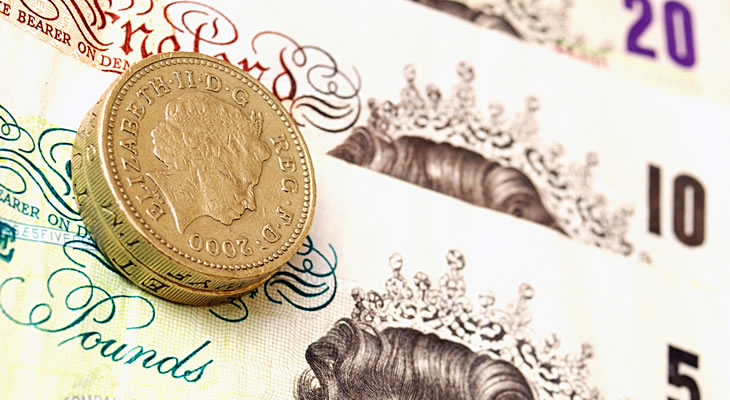The Pound Sterling to Euro (GBP/EUR) exchange rate has been shaken by negative news in both the UK and the Eurozone since the weekend but Sterling seems to have come off worse.
Conservative Party Disagreements Regarding 2016 Budget Intensify as EU Referendum Draws Closer
Last week’s UK Budget for 2016 was delivered to Parliament by Chancellor of the Exchequer George Osborne and has been met with a string of controversy that seems unlikely to end for the Chancellor any time soon.
Resurged anger towards the budget distracted the financial market from surprisingly hawkish Bank of England (BoE) announcements later in the week, and the Pound has fallen against its European rival once again. The GBP/EUR pair is currently down on opening levels by around -0.60%, trending near 1.2714.
Over the weekend, Work and Pensions Secretary Iain Duncan Smith resigned from his influential position in reaction to Osborne’s announcement that disability benefits would be cut even further.
While Smith had previously been an advocate of disability benefit cuts, and headed many in his time as secretary, he described the new proposed cuts as ‘deeply unfair’ and resigned due to finding them indefensible.
This apparent change of heart has spurred critics and analysts to speculate that Smith’s supposed reason for resigning could be a front for the real reason – Smith passionately believing in a UK ‘Brexit’. However, IDS has maintained that the Budget is his genuine reason for resigning.
Many analysts have also noted the increased amount of infighting within the Conservative government. While there were already disagreements on what course of action voters should take in the June EU Referendum, continued disagreement over the Budget as well as the resignation of such an influential member of the government has seen what some analysts are calling fractures and fissures in the party.
Some analysts and investors have even begun to speculate on the possibility of Prime Minister David Cameron’s government falling apart, especially in the aftermath of June’s historic vote. Sterling has weakened considerably even against its weaker rivals as political concerns and tensions skyrocket once more.
Euro (EUR) Struggles in the Face of Slowed Growth and Further Possible Easing Measures from the ECB
Not faring much better itself, the Euro’s trip-ups continue this week as Germany’s Markit PMI releases this morning. Bloomberg reports that German manufacturing, while forecast to increase in March, has actually contracted to its slowest pace in 16 months.
As one of the biggest manufacturing economies in the world and the Eurozone’s largest economy, a forecast 50.8 reading in the manufacturing index was undercut by a disappointing 50.4, down from last month’s 50.5 and closer to the 50 mark separating growth from contraction.
This slowing of growth has left some investors and analysts wary of the shared currency. Further anxiety towards the Euro may have been inspired by suggestions from the European Central Bank’s Chief Economist Peter Praet that President Mario Draghi was being untruthful when he suggested the ECB had used up its easing options.
Praet even brought up the controversial idea of ‘helicopter money’ as a means to inspire consumer spending in the Eurozone. This would mean printing and handing out money to citizens, an extreme measure that no major economy has ever taken before.
While these factors hold down the Euro, poor news for Sterling is making investors favour the single currency over it.
Newly released British data showed that February’s non-Core CPI printed below forecasts in both year-on-year and month-on-month categories. Year-on-year CPI was expected to increase to 0.4%, but instead held at 0.3%.
Pound Sterling to Euro (GBP/EUR) Exchange Rate Forecast: Political Uncertainty Likely to Continue Holding Back Sterling
It seems unlikely that we have heard the end of George Osborne’s budget as the Conservative government adapts to its new Work and Pensions Secretary, Stephen Crabb, and Osborne is pressured to speak to Members of Parliament about his Budget once more.
Osborne is expected to defend the Budget he discussed last week in a meeting with Parliament today. The Chancellor has already been seen as ‘failing’ to hit many of his goals and has come under fire from both opposition leader Jeremy Corbyn and his own boss David Cameron.
Some analysts even predict that Osborne could be pressured to resign himself as a scapegoat for these perceived failures in order to allow the Tory government to stabilise ahead of the EU Referendum and, more long-term, the 2020 election.
UK Retail Sales data is also expected to be released later this week, though further political fissures and uncertainty are likely to prevent the Pound from enjoying many bullish movements even if consumer spending is shown to have increased.
The Euro, on the other hand, could re-strengthen itself if consumer confidence and French GDP data comes in more positively than expected, however weaker data as well as continued ECB pressure could have the opposite effect.
The Pound Sterling to Euro (GBP/EUR) exchange rate is currently trending in the region of 1.2714 while the Euro to Pound Sterling (EUR/GBP) exchange rate trends in the region of 0.7864.


Comments are closed.